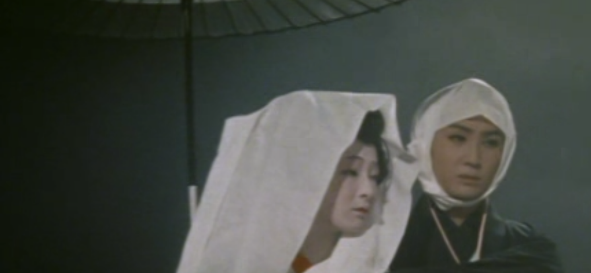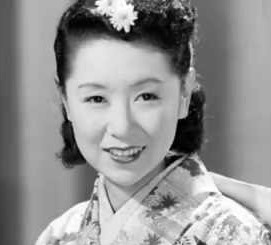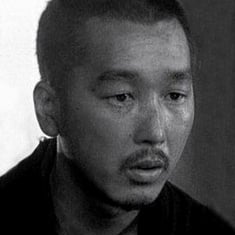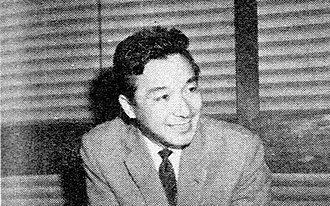Physical Address
304 North Cardinal St.
Dorchester Center, MA 02124

Other titles: Their Own World (alternate English title); Naniwa Love Story, Story of a Love in Naniwa [i.e., Osaka] (literal English titles)1
| Production Company | Tōei (Kyoto) |
| Scenarist | Narusawa Masashige |
| Producer | Okawa Hiroshi |
| Source | The Courier for Hell (Meido no Hikyaku (1711 Bunraku play)) by Chikamatsu Monzaemon, and Couriers of Love Fleeing to Yamato (Koibikyaku Yamato Orai (1796 Kabuki play)) based upon Chikamatsu’s play and another puppet play, Keisei Koi no Hikyaku (1773) by Suga Sensuke and Wakatake Fuemi.2 |
| Cinematographer | Tsuboi Makoto (as Tsudoi Makoto) |
| Art Director | Suzuki Takatoshi |
| Production Designers | Ogawa Takaya, Tamaki Jun’ichirō and Tsujino Kimiharu |
| Music | Tominaga Saburo |
| Costume Designer | Mikami Gō |
| Editing | Miyamoto Shintarō |
| Performers | Nakamura Kinnosuke (Kameya Chubei, a courier);3 Arima Ineko (Umegawa, a courtesan); Kataoka Chiezō (Chikamatsu, a famous playwright); Tanaka Kinuyo (Kameya Myokan, a widowed merchant); Hanazono Hiromi (Otoku, Myokan’s daughter); Yujishiro Keiko (Chiyozo, a courtesan); Tōno Eijirō (magnate Tobei); Chiaki Minoru (Hachiemon, known as Hachi, a client of Myokan); Shindo Eitarō (Tsuchiya Jiemon, a brothel proprietor); Nakamura Yoshiko (Okiyo, a brothel proprietress); Naniwa Chieko (Oen, a maid in the brothel); Ueki Chie (Otama, a little girl living in the brothel) |
| Status | Extant |
| Photography | Color4 |
| Format | 35 mm |
| Ratio | 2.35 : 1 (Tōeiscope) |
| English Subtitles | Yes |
| Original Release Date | September 13, 1959 |
| Length | 105 minutes |
| Award and festival / retrospective screenings | Kinema Junpo “Best Ten” (at #7); Mainichi Film Concours: Suzuki Takatoshi, Best Art Direction; Tokyo FILMeX (2004); IFFR (International Film Festival of Rotterdam, 2005); Melbourne International Film Festival (2005); MOMA Retrospective (2016) |
During a performance, in Japan in 1710, of a puppet play by the famous playwright Chikamatsu at the Takemotoza Theater (to a less-than-full house), magnate Tobei conveys a message to Chikamatsu offering money to help keep his theater going. The playwright insists to the colleague who transmits this message that the quality of the show is more important than money, but he agrees to meet the magnate over drinks.
Meanwhile, a courier, Chubei, meets with Myokan, his legally adoptive mother and employer, who is seated in a box at the theater. He is her designated heir in the prominent Osaka merchant house of Kameya. He informs her that there will be a guild meeting that evening to decide the fate of a courier who had embezzled one ryō.5 She urges him to go in her stead, as such tasks will become part of his duties when he inherits the business. Myokan’s daughter, Otoku, whom he is expected to marry one day, regrets that he can’t stay to see the show.
In the street, Chubei meets his client Hachiemon (Hachi), an older man who is also a member of the guild, and informs him of the meeting, and so they go to the guild hall together. Afterwards, Hachi tells Chubei that his adoptive mother, Myokan, is driving him, Chubei, like a slave or a stud horse. Hachi promises to show him a good time in Shinmachi, Osaka’s red-light district, though the young man is reluctant. Chikamatsu, relaxing in the same restaurant, overhears their conversation.
Hachi literally drags Chubei through the main gate into Tsuchiya Jiemon’s brothel in Shinmachi. Hachi selects a courtesan, Chiyozo, for himself, while a beautiful, kind, but melancholy courtesan, Umegawa, is assigned to service the virginal Chubei. Chubei wants to leave the brothel, but Umegawa tells him she will be punished if he goes away without spending the night with her.
At the same time in the brothel, the brothel proprietor, Jiemon, happily informs the playwright that magnate Tobei has agreed to subsidize his theater, but Chikamatsu appears ambivalent about this offer. The playwright witnesses, in another part of the brothel, the compassionate Umegawa bandaging a cut on the finger of a little girl, Otama. This act is also witnessed by the drunken magnate, and in front of the other guests, he mockingly asks Umegawa to bandage his (uninjured) finger, much to her dismay. Umegawa returns to her room to entertain Chubei, and by morning it’s clear that she has fallen in love with him.
Umegawa asks Jiemon for a loan of five ryō (a very small sum for the brothel-keeper) to give to her destitute uncle to buy medicine for her sick mother. Jiemon consents, but only on the condition that she agree to extend her term of service as a prostitute. Umegawa returns to her room and to Chubei. When he asks if her life is hard, she bitterly calls herself “merchandise that talks, laughs, cries and gets angry.” Chikamatsu, overhearing this conversation from a nearby room, hears her say “Money is the enemy,” and writes down this phrase for future use.
At House Kameya, Myokan summons Chubei to inform him that he is to go the following day to the capital, Edo (later to be called Tokyo), to collect 40 ryō from one client and 30 ryō from another. That night, at the brothel, Umegawa entertains the magnate, who offers the courtesan her own shop in Osaka in exchange for marrying him, though it’s clear that she still loathes him.
Meanwhile, Chubei, waiting in Umegawa’s room, happens upon a letter the courtesan had been writing to her mother, in which she mentions the five ryō that she had given her uncle for the mother’s medicine. When Umegawa returns, Chubei has already gone, though the poor courier had left behind five ryō of his own money to restore to her the money she’d given for her mother. When he returns to House Kameya, Chubei promises Otoku that he will work hard for both the business and for her sake.
Chubei journeys to Edo, where he meets with a merchant who tells him that Hachi had sent him a letter entrusting 50 ryō as a remittance to Chubei’s care, and he gives him this money as well as the 70 ryō from the other two clients. Back in Osaka, Umegawa receives a gift sent by messenger from Chubei in Edo. She is delighted… until she opens the package and sees that the gift is a comb, a symbol of final farewell. She weeps, and elsewhere in the brothel, Chikamatsu is awakened by her crying.
Proudly, Jiemon and Okiyo announce to Umegawa that the magnate wants to use his great wealth to ransom her, which means she will no longer have to serve her term as a courtesan. However, instead of rejoicing, she weeps, and the two brothel-keepers become increasingly annoyed.
Jiemon later tells his partner Okiyo that the magnate had written to repeat his offer to ransom Umegawa and that he will be returning to Shinmachi to marry her by the middle of the month. He orders Oen not to allow the courtesan to entertain any more clients before the magnate’s return. Oen informs Jiemon that Chubei is in Umegawa’s room, so Jiemon instructs her to give Chubei his money back and order him to leave.
In Umegawa’s room, the courtesan expresses gratitude to Chubei that he had come back to her directly from Edo, even before returning to House Kameya. Oen enters and informs Chubei that he can no longer sleep with Umegawa because the magnate has first claim on her body. Furious, Chubei stalks off to confront Jiemon.
Chubei tells the brothel owner that he, not the magnate, will ransom Umegawa, and gives him the 50 ryō intended for Hachi. Jiemon tells the courier that he’ll keep the 50 ryō for the time being, but that the magnate has priority and Chubei will have to come up with at least 250 additional ryō to ransom the courtesan. He tells Jiemon that he will obtain the money from his (former) father, a rich farmer.
At House Kameya, an angry Hachi complains to Myokan that he still hasn’t received his 50 ryō from Edo. She is not aware that Chubei is already back in Osaka, and is worried that he may have fallen ill somewhere. As Hachi is leaving the house, it suddenly dawns on him to look for the courier in Shinmachi. Hachi finds Chubei in the backyard of Jiemon’s brothel. Chubei asks him for two or three days to find the 50 ryō to pay him back, and reminds him that it was he, Hachi, who had first brought him through the main gate at Shinmachi. Hachi reluctantly agrees to give Chubei two to three days to come up with the money.
Chubei returns home with Hachi. The courier gives Myokan the 70 ryō for the two clients, but Myokan also demands the 50 ryō for Hachi. Chubei pretends that what is actually an empty water container is the sealed package containing the money, and Hachi goes along with this ruse. Myokan is oblivious, but the bewildered Otoku witnesses this deception. Chubei goes upstairs and opens a letter from his father replying to his request for assistance, but the letter contains platitudes, not money, crushing his hopes.
An angry member of a samurai clan, the Yonagos, confronts Myokan with the fact that an expected 300 ryō shipment from Edo has not yet arrived. Myokan apologizes and assures him that he will suffer no business loss. Shortly after the samurai leaves, a messenger appears with the 300 ryō from Edo. Myokan orders Chubei to bring this money immediately to the Yonagos.
On his way to deliver the money, accompanied by a little boy, Chokichi, from House Kameya, Chubei is unable to stop himself from going to Shinmachi instead. He gives Chokichi some coins to buy noodles and proceeds alone to the brothel.
The magnate arrives at the brothel first, preparing to celebrate his nuptials that night with Umegawa. He gives the full 300 ryō for her ransom to Jiemon. When the latter points out that he’s already received 50 ryō from Chubei, the magnate disdainfully orders him to return Chubei’s money, adding two ryō coins of his own as “interest.”
Chubei arrives and confronts Jiemon, Okiyo and the magnate. Jiemon tries to return the 50 ryō plus interest to Chubei, but he refuses to accept it. Jiemon points out that Chubei would need at least 250 more to match the magnate’s offer. Soon they are all laughing at the furious Chubei. He insists that they not go through with the ceremony until he’s discussed the matter with Umegawa.
Outside Umegawa’s room, Chubei overhears Hachi revealing to her and several other courtesans that the 50 ryō the courier had offered for her ransom was really remittance money intended for him. The other women in the room are disgusted by the “swindler” Chubei, but Umegawa is horrified, realizing that he has destroyed his career for her. Humiliated, Chubei breaks the seal of one of the packages he’s carrying, and numerous ryō coins drop to the floor around his feet. Chubei offers Hachi these coins as payback for the money he’d stolen from him (though these coins are themselves stolen from the Yonago clan), while berating him as a false friend.
The magnate and Jiemon arrive on the upper floor for the wedding. Chubei drags Umegawa into the room where the ceremony is to take place, and breaks the remaining seals, spilling coins worth hundreds of ryō onto the floor. Chubei then claims the weeping Umegawa as his wife.
The authorities later arrive at House Kameya looking for Chubei. When Myokan asks what has happened, they inform her that Chubei is an embezzler, and since Chubei is not at home, they will arrest her instead. Myokan tells her daughter that this is the end of House Kameya and urges her to be strong, remarking before she’s taken away that “the devil has gotten into Chubei.” Weeping, Otoku says she knows it wasn’t the devil that possessed her “brother.”
As the news spreads about the embezzlement, Chikamatsu’s associates at the theater ask him what would cause these young people to act in such an outrageous fashion. The playwright, instead of answering, leaves the room to go home. The others ask the manager whether something they had said might have offended the playwright, but he replies that Chikamatsu had the same faraway look just before he wrote his famous play, The Love Suicides at Sonezaki. The others then begin to speculate on whether the playwright is about to compose a new masterpiece.
The scene shifts to the snows of rural Japan, as a posse hunts for the fleeing lovers. Chubei begs Umegawa to separate from him to save herself. He admits that he embezzled from the Yonago clan the money he had used to ransom her. She always suspected that he was guilty and is glad that he finally admitted it. He is very moved that she would stay with him regardless of his crime, and she, weeping, tells him that she’d never let him die alone. They resolve to continue running away together.
In Osaka, Chikamatsu’s associates come to check up on him and are surprised that he hasn’t yet started his play about the young lovers. He admits that he’s having trouble coming up with the drama’s final act. The others believe that he simply needs to tell the truth about what happened. Chikamatsu replies that if that were true, they wouldn’t even need a writer. The task of the writer, he says, is “to take reality and stir emotions.”
At the brothel, Oen announces that the lovers have been caught at Ninokuchi village, and the playwright realizes that they must have gone there to try to meet with Chubei’s father. Attempting to write the scene later, Chikamatsu realizes that he doesn’t want merely to record the grim reality – namely, that Chubei was arrested and executed, and Umegawa brought back by force to resume her job as a prostitute.
Chikamatsu then witnesses Umegawa’s return to the brothel, with a black hood placed over her head to mark her shame. In her room, the courtesan recalls the dreadful scene of the fugitive couple’s arrest at Ninokuchi village, where Chubei, just before his execution, declared that he alone was guilty in order to protect her from punishment. She then, in the present, tries to commit suicide by throwing herself down a well in the courtyard, but the little girl Otama and Chikamatsu restrain her. When she begs Jiemon to be allowed to die, he scornfully reminds her that he still has money invested in her body and has her forcibly brought back to her room.
Sometime later, Chikamatsu’s new puppet play about the lovers is being performed at the Takemotoza to a full house. The scene enacted by the dolls is one that didn’t occur in real life: the puppet version of Umegawa persuades Chubei’s former father to meet with Chubei one last time, and she blindfolds him so as to prevent him from being legally implicated in his son’s crime. The puppet Chubei and the father then embrace while Umegawa weeps. Chikamatsu watches the scene from the back of the hall, while in his memory hearing Umegawa’s desperate cry, calling out for her beloved Chubei.

Tanaka Kinuyo was one of Japan’s most distinguished actresses, and only the second woman in Japanese Cinema history to become a director of feature films.6 She made her acting debut in 1924, while still in her mid-teens. She became a major star later in the decade, and in 1931 appeared in a leading role in Japan’s first full-length talkie: Gosho Heinosuke’s classic comedy, The Neighbor’s Wife and Mine (Madamu to nyōbō). In the postwar period, she appeared prominently in works by all of the “Big Four” directors: Ozu Yasujirō (The Munekata Sisters (Munekata kyōdai, 1950) and Equinox Flower (Higanbana, 1958)); Naruse Mikio (Mother (Okaasan, 1952) and Flowing (Nagareru, 1956)); Kurosawa Akira (Red Beard (Akahige, 1965)); and, especially, Mizoguchi Kenji. Her classic performances in that director’s The Life of Oharu (Saikaku ichidai onna, 1952) and, particularly, Ugetsu (Ugetsu monogatari, 1953) brought her work to the attention of an international film audience. At about the same time, she began a career behind the camera. She made her debut as director with Love Letter (Koibumi, 1953) and helmed five other films in seven years, including The Moon Has Risen (Tsuki wa noborinu, 1955, script co-authored by Ozu), The Eternal Breasts (Chibusa yo eien nare, 1955) and her final movie as director, the 1962 period film Love Under the Crucifix (Ogin-sama), starring Arima Ineko. She died of a brain tumor in March 1977, age 67.

Chiaki Minoru was a character actor who is mostly known for his work for Kurosawa Akira. He made his film debut in 1949 in the small but memorable role of the girlie show director in Kurosawa’s classic detective film Stray Dog (Nora inu). Thereafter, he demonstrated his versatility in many famous roles for that director. Some of these include the tormented priest in Rashomon (1950), the “second-rate” samurai Heihachi in Seven Samurai (Shichinin no Samurai, 1954), the Banquo role in the director’s adaptation of Shakespeare’s Macbeth, Throne of Blood (Kumonosu-jō, 1957) and a comic porter in the adventure film, The Hidden Fortress (Kakushi-toride no san-akunin, 1958). He also appeared in Hero of the Red-Light District for Uchida, as well as many other movies by prominent directors. However, he was officially honored for only one film late in his career: Itō Shun’ya’s Grey Sunset (Hana ichimonme, 1985), in which he played a former professor afflicted with Alzheimer’s disease. For this performance, at the age of 68, he won three separate Best Actor awards. He died in 1999, about a year after Kurosawa’s death.

Narusawa Masashige served as co-screenwriter for several late-period Mizoguchi Kenji films: Woman of the Rumor (Uwasa no onna, 1954), Princess Yang Kwei-Fei (Yōkihi, 1955), Taira Clan Saga (Shin Heike monogatari, 1955) and Street of Shame (Akasen Chitai, 1956). For Toyoda Shirō, he scripted the classic film Wild Geese (Gan, 1953, a.k.a., The Mistress), and for Tanaka Kinuyo (see above), he composed the screenplay for the 1962 film Love Under the Crucifix (Ogin-sama). Of his five credited films as director or co-director, his best-known is the 1962 movie The Body (Ratai, literally “The Nude”), about a sexually-active modern woman who feels no shame about her desires, starring Saga Machiko, who in the same year appeared in Uchida’s The Mad Fox. Narusawa also co-authored the script for the first installment (1961) of Uchida’s five-part series Miyamoto Musashi. He died in February, 2021, at age 96.
Trivia Note: In 1961, about two years after they appeared in this movie, the two leading actors, Nakamura Kinnosuke and Arima Ineko, were married. However, they divorced four years later.
(Continued on Page 2)
[…] in this film, she starred in The Body (Ratai), directed by Uchida screenwriter Narusawa Masashige (Chikamatsu’s Love in Osaka). She also appeared in the final installment of Inagaki Hiroshi’s Miyamoto Musashi (a.k.a., […]
[…] Chikamatsu’s Love in Osaka (Naniwa no koi no monogatari; 浪花の恋の物語), 1959 […]
[…] in 1959, right after the final installment of the Great Bodhisattva Pass trilogy, but just before Chikamatsu’s Love in Osaka – quite a busy year for a 61-year-old […]
[…] Police Officer (Keisatsukan, 警察官), 1933A Bloody Spear at Mount Fuji (Chiyari Fuji; 血槍富士), 1955Twilight Saloon (Tasogare Sakaba; たそがれ酒場), 1955Chikamatsu’s Love in Osaka (Naniwa no koi no monogatari; 浪花の恋の物語), 1959 […]
[…] over 250 film and TV credits over six decades. For Uchida, he would later appear in Dotanba (1957) Chikamatsu’s Love in Osaka (1959), The Master Spearman (1960) and the fourth installment (1964) of the five-part Miyamoto […]
[…] Police Officer (Keisatsukan, 警察官), 1933A Bloody Spear at Mount Fuji (Chiyari Fuji; 血槍富士), 1955Twilight Saloon (Tasogare Sakaba; たそがれ酒場), 1955Chikamatsu’s Love in Osaka (Naniwa no koi no monogatari; 浪花の恋の物語), 1959 […]
Hey, I think your mostly on target with this, I wouldnt say I totally agree , but its not really that big of a deal .
Based on your comments, I assume you’ve seen the film. Just out of curiosity, though you say it’s not a big deal, what precisely don’t you agree with?